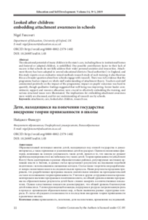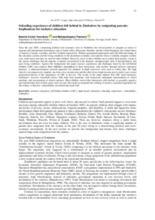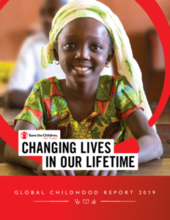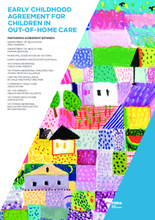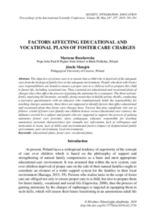Displaying 111 - 120 of 349
The purpose of this scoping review is to assess the effectiveness of independent living programs on educational outcomes among youths aging out of the foster care system in United States.
This exploratory, qualitative, multi-case study sought to understand, from the perspective of successful foster alumni college students, the role and influence of family members.
Attachment theory has been adopted in several educational districts (‘local authorities’) in England, and this study reports on an evaluative mixed-methods research study of such training; it also theorises this as a broader question about how schools engage with research.
This paper assesses experiences and challenges faced by the left-behind children (LBC) in Zimbabwe and explores these children’s perceptions of their interactions with teachers through inclusive education practices.
In commemoration of its founding 100 years ago, Save the Children is releasing its third annual Global Childhood Report to celebrate progress for children.
The purpose of this study was to gain insights into the perspectives of child welfare alumni related to the educational experiences that facilitated or presented obstacles to academic and social-emotional resilience and well-being and to what extent.
The Early Childhood Agreement for Children in Out-of-Home Care (OOHC) was first developed in 2014 as a shared commitment by the Victorian Department of Education and Training (DET), the Department of Health and Human Services (DHHS), the Municipal Association of Victoria (MAV) and Early Learning Association Australia (ELAA) to support young children in OOHC in Victoria, Australia to access key early childhood services.
In this study, the authors analyzed the literature on foster care in Poland and conducted a narrative questionnaire with an educator who simultaneously holds the responsibility for teaching youth in foster care autonomy in order to identify factors that affect educational and vocational plans that foster care charges have.
By age 16 the attainment of most children in or on the edge of out of home care has fallen well behind the average for their age. This paper uses the English National Pupil Database to examine how much of this falling behind occurs before the age 7, and how any subsequent decline relates to time in care as against time outside it.
The aim of this doctoral thesis was to identify why there are higher rates of unauthorised absence from school among post-primary looked after children and young people (LACYP), what does this tell us about their educational experiences, and what is known to be helpful or unhelpful in addressing this issue.

